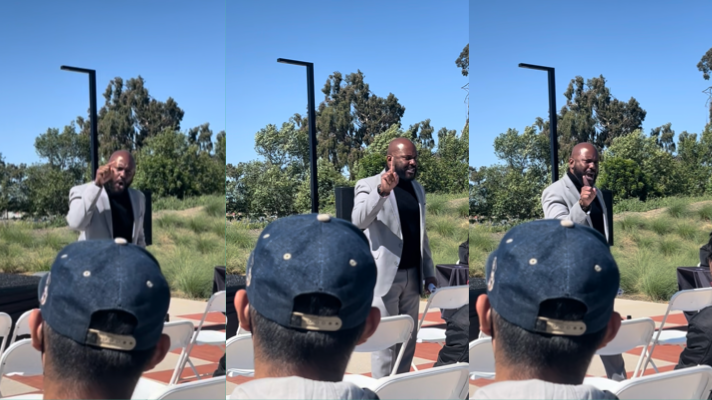‘She’s Not From This Country’: Assemblymember Mike Gipson Dismisses Opponent, Student Activist and Environmental Record at Town Hall
Gipson dodged questions about his environmental record by claiming those issues “don’t matter to the people in my community.”
9 minute readAssemblymember Mike Gipson (D-Carson) shouted at a student activist as part of a minutes-long rant at a town hall Tuesday afternoon when questioned about his environmental record. Gipson later dismissed his opponent in the coming election as “not from this country.”
The Assemblymember, who is running for reelection and represents part of North Long Beach, became irate after Cynthia Taboada asked whether Gipson’s votes against environmental justice legislation were influenced by donations he has received from industrial polluters. Taboada is a student intern with Project Super Bloom PAC, a youth-led political action committee supporting progressive candidates in California.
The town hall was held at Cal State Dominguez Hills and was hosted by Gipson’s staff and the university’s student union. The event focused on affordable housing and public safety and invited participants to “voice their concerns and present policy improvements that may be introduced at the California legislature.”
“You have failed to stand up for the people in your district that are suffering from health issues due to air pollution,” Taboada said at the town hall.
Gipson asked Taboada to cite specific votes to which she answered “environmental issues.” He then launched into a sprawling rant lasting more than four minutes, touching on his past as a janitor, his time as a police officer and the death of his son. Gipson also brought up his support for low-income workers, arguing that criticisms of his environmental record are immaterial in comparison to job retention.
“Don’t come and tell me about the things I should be working on that don’t matter to the people in my community!” Gipson shouted after listing legislation that he has supported and becoming emotional discussing personal tragedy.
“What matters to the people in my community is the people putting food on their table, clothes on their children’s back, and a roof over their heads,” Gipson continued. “That’s what I fight for each and every day.”
After the event, when asked for a response to similar criticisms made by his primary opponent for Assembly District 65, Fatima Iqbal-Zubair (D), Gipson questioned her credibility in addressing concerns from district residents.
“She’s not from this country,” Gipson said.
Born in Dubai, Iqbal-Zubair immigrated to the United States from Canada and is a praciticing Muslim woman.
Iqbal-Zubair responded by calling the comment “Trump-esque” and “highly offensive.”
“That’s what Trump says when he talks about (Congressmembers) Ilhan (Omar) and Rashida (Talib)” she said. “That is a Republican talking point.”
This is not the first time Gipson has been criticized for othering his opponent. In 2014, Gipson’s campaign distributed a mailer featuring his then-opponent’s face superimposed on the image of a hooded person pointing a handgun at the camera. Gipson later said the mailer “went too far.”
FORTHE reached out to Gipson but did not receive a response.
“The person who you represent,” Gipson said referring to Taboada and Iqbal-Zubair, “they don’t give a damn about the people (who live in this district) because they just moved here.”
Both Project Super Bloom and Iqbal-Zubair said that the call out was not coordinated and was directed by Taboada herself. Super Bloom has committed student interns to help Iqbal-Zubair’s campaign with phone banking and canvassing in the past.
After the event, Gipson criticized Iqbal-Zubair for relying on her personal wealth to move into the district to run for the seat. Iqbal-Zubair acknowledges that her husband is employed by Raytheon and makes a six-figure salary but maintains that they are renting after her former residence was drawn into a different district during last year’s citizen redistricting process. Gipson and Iqbal-Zubair first ran against each other in 2020.
Gipson also claimed after the event that Iqbal-Zubair is self-funding her campaign and misleading voters by portraying her run as being driven by small-dollar donations. A review of Iqbal-Zubair’s campaign contributions from last year shows the average donation amount was $211. Gipson’s average donation during the same period was $2,517. Iqbal-Zubair loaned her campaign $10,000 in February of last year.
“You have voted no on several bills to limit this air pollution. Do you think that would have anything to do with the nearly $200,000 you have received from fossil fuel industries?” Taboada asked Gipson.
According to Los Angeles Daily News’s coverage of his 2020 election, Gipson received $170,780 from the oil and gas industry over the years but most of his campaign funds came from labor unions.
Tomisin Oluwole
Dine with Me, 2022
Acrylic on canvas
36 x 24 inches
Click here to check out our interview with Tomisin Oluwole, a literary and visual artist based in Long Beach.

Instead of gunking up our site with ads, we use this space to display and promote the work of local artists.
Last year, Gipson received thousands of dollars in contributions from the fossil fuel industry, including $3,000 from Marathon Petroleum, $500 from Signal Hill Petroleum, $3,000 from Sempra Energy, and $2,500 from the California Independent Petroleum Association PAC, an oil industry lobbying group, according to campaign finance records.
“What has (Iqbal-Zubair) done, tangible, to make peoples’ lives better but stand on a soapbox and throw stones?” said Gipson. “I have a record to stand on. I’m saving people’s lives on a daily basis.”
Iqbal-Zubair shot back, pointing to her years of community organizing in the district as well as over three years teaching science in the low-income South LA community of Watts where she started a first-of-its-kind robotics team that is currently profiled in the Disney+ documentary “More Than Robots.” She also refutes that environmental impact doesn’t matter to the residents of District 65.
“It doesn’t matter? What is he gonna say to some of the highest asthma rates in California? Highest cancer rates?” said Iqbal-Zubair. “Does he not care about peoples’ health?”
An oft-repeated talking point by Iqbal-Zubair is that four out of California’s 15 oil refineries are located in the newly drawn District 65, two of which are run by Gipson contributor Marathon Petroleum. Living near an oil refinery increases an individual’s risk of diseases including asthma, cancers, birth defects, and more, according to the Office of Environmental Health Hazard Assessment.
Wilmington, a 9.14-square-mile community in the district with a roughly 87% Latino majority, contains more than half of the City of L.A.’s active oil wells. According to a study by the South Coast Air Quality Management District, the communities of Carson, Wilmington, and West Long Beach have rates of asthma-related emergency department visits over 40% higher than the state average. These communities also have higher than average cancer risk for the region.
AB 345, which would have required protective distances between oil and gas production and residences and schools, passed the Assembly—where Gipson abstained—and failed in the Senate. Earlier this year, the L.A. City Council banned new oil wells and ordered a study to determine how to phase out existing wells.
“He’s not acknowledging environmental racism which means that this pollution is happening in much greater portions in communities of color,” argues Iqbal-Zubair. “There are activists of color, Latino activists, Black activists in Watts that have been fighting against lead (exposure), against unclean water, long before I got there. He’s discounting all of that.”
“I’ve been focussed on jobs… that has been my priority,” said Gipson.
The debate reflects an inter-Democratic Party clash between labor and environmental organizations.
The State Building and Construction Trades Council, which represents oil and natural gas workers, has killed legislation aimed at ending California’s reliance on fossil fuels arguing it leaves workers behind. They’ve donated significantly to Gipson including $22,100 last year coming from affiliated Pipe Trades PACs.
A 2020 analysis commissioned by the California Energy Commission and California Public Utilities Commission found that oil accounted for 57,300 jobs statewide while natural gas accounted for 8,254 jobs. A significant number, but a relatively small portion of over 19 million Californian jobs across all sectors.
A largely staid event prior to the confrontation between Gipson and Taboada, the town hall was attended by roughly a dozen students who addressed issues like housing and food insecurity as well as a recent student suicide. The sluggish midday campus was quickly roused when a fire alarm sounded at a neighboring student housing building which cut the event short. University police later confirmed it was a false alarm.
“He was trying to get his point across through yelling at me and being kind of aggressive,” Taboada said after the event. “He didn’t really answer the question.”
“I know he was trying to intimidate me,” she said. “It didn’t really intimidate me, more so, I didn’t feel heard”
Taboada says that she wanted to ask a follow-up during his response but was not given the opportunity. She points to three key pieces of environmental legislation that did not receive Gipson’s support including: AB 1395, which codifies into law an executive order by former Governor Jerry Brown committing the state to carbon neutrality by 2045; AB 1328, requiring reporting on the climate and health impacts of idle, deserted and abandoned oil wells; and SB 100 which sets a goal of 100 percent carbon-free electricity by 2045. Gipson voted no on AB 1395 and SB 100 and abstained on AB 1328; all three bills passed.
“Cynthia was asking, as all of his constituents have a right to, whether these contributions are buying his vote and buying his inaction on the climate crisis and environmental racism,” said Project Super Bloom Northern California Organizing Director Jonah Gottlieb.
Taboada says she has been a resident of District 65 since becoming a student at California State Dominguez Hills three years ago. She’s studying Political Science and says her experience with Gipson has encouraged her to continue to call out elected officials on questionable contributions and bad votes.
“It encourages me to do it more,” Taboada says. “These people are deciding our future.”


 joe@forthe.org
joe@forthe.org




